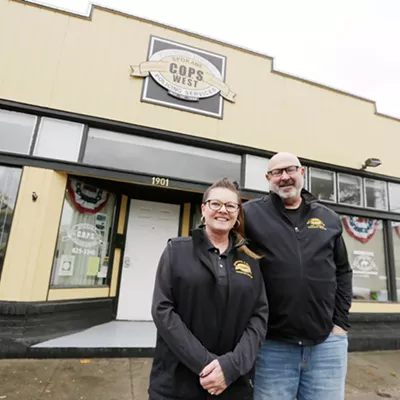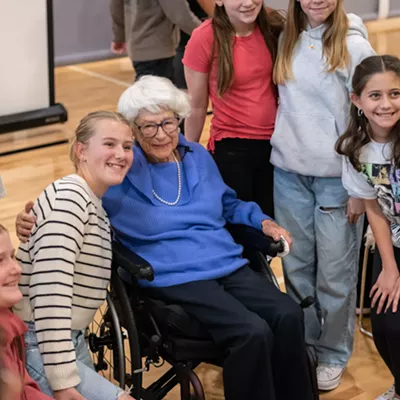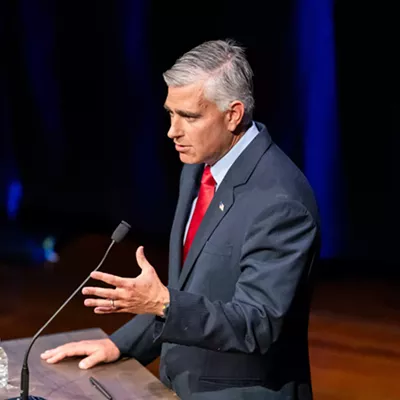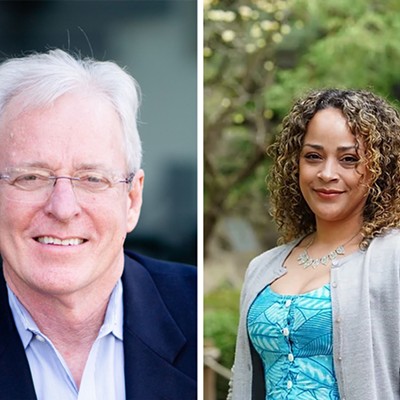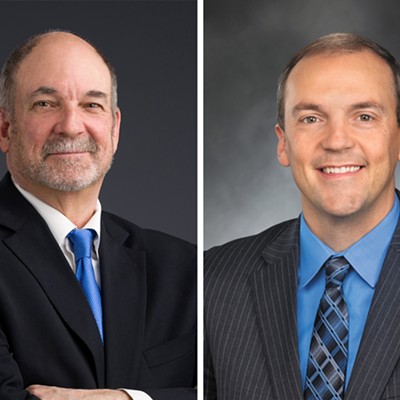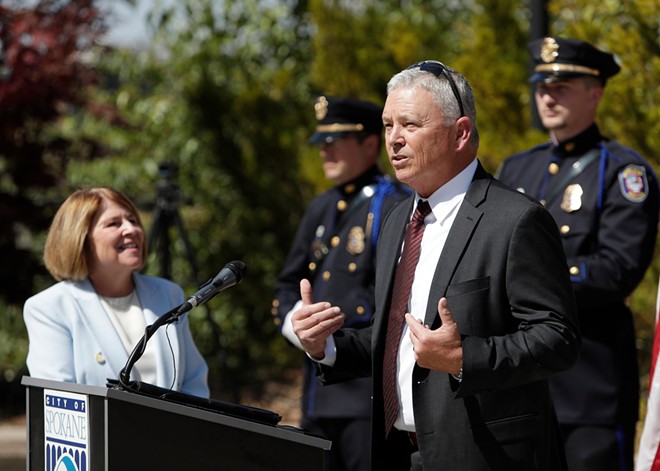
To say that new Spokane Police Chief Kevin Hall has a lot on his plate is an understatement.
"We're trying not to overwhelm him," says Dave Dunkin, president of the Spokane Police Guild, the union that represents city police officers below the rank of sergeant. "This is a lot of pressure for one man to bear on his shoulders."
Hall, a 32-year veteran of the Tucson Police Department, was chosen to lead the Spokane Police Department after a national search. He was sworn in last Monday at a ceremony in the Tribal Gathering Place outside City Hall.
"In the days ahead we will face challenges, no doubt," Hall said at the ceremony. "But we will face them together as a department, as a city and as a community."
Community leaders say they have high hopes for Hall — and numerous challenges they hope he can tackle. Here's a look at some of them.
THE SHOOTING PROBLEM
The Spokane Police Department has the second-highest rate of officer-caused deaths, by population, in the country, according to Mapping Police Violence, a police accountability group that tracks fatal police responses across the country. (Tucson Police Department has the sixth-highest rate.)
It's a stark statistic, and bringing the number down has to be Hall's top priority, says Anwar Peace, a longtime police accountability activist who also chairs the city's Human Rights Commission.
"It's because of their flawed training philosophy that this has taken place," Peace says. "I remember I was hopping mad when we were fifth" in the country.
In addition to overhauling officer training, Peace wants to see Hall implement better mental health protocol for officers. He's concerned about the fact that officers are often cleared to go back on patrol just weeks after they've shot someone.
"Because of our staffing issue, they are kind of forced to have these officers stay on the streets," Peace says.
Peace stresses that he doesn't just want platitudes. He wants to see Hall produce a concrete plan to lower the number of police shootings.
"With the amount of money that he is making, I'm giving him 100 days," Peace says. "I need to see some action."
STAFFING AND BUDGET
The police department is Spokane's most expensive department. It's also one that may face steep cuts if the city fails to address its $50 million structural budget deficit.
To address the shortfall, Mayor Lisa Brown has proposed a "community safety" sales tax increase that will appear on the Nov. 5 ballot. The proposed 0.1% sales tax would cost an additional 10 cents for every $100 people spend.
Brown says Hall is digging into the department's budget and looking at recommendations that former Interim Chief Justin Lundgren made, "should there be a need for reductions."
To save money, the department has instituted an early retirement incentive program for officers with at least 20 years on the force. The idea was proposed by Dunkin, the police guild president, in an effort to "lower personnel costs and also help some of my members retire with some dignity."
"I'd like to counter the narrative that the mayor is defunding the police," Dunkin says. "That was my idea, and I really am thankful that they chose to do that."
Eighteen officers have taken the offer so far. Dunkin says he thinks the change will be good in the long run, but he acknowledges that "those of us that are left behind are going to have to pick up even more slack."
Even when fully staffed with 356 commissioned officers, Spokane's number of officers per capita is lower than the national average.
"There are not enough of us to do what the citizens are asking us to do," Dunkin says.
FENTANYL AND BEHAVIORAL HEALTH
Hall has experience fighting fentanyl. The drug "changed everything" when it arrived in Tucson, he said during his swearing in ceremony.
"Nobody has cracked this nut yet when it comes to unsheltered and the fentanyl epidemic," Hall said. "We're going to need a little bit of latitude and time to figure this out with the community."
Peace, who sat on the search committee, says he was impressed with Hall's treatment-oriented philosophy. Hall has stressed that addiction itself is not a crime, and police can't be the only solution for people experiencing substance use and mental health issues.
"When he started talking about [overdose] response teams, he was speaking to my heart there," Peace says. "Trying to engage with that population in a way that is not 'I'm going to book you.'"
Sheldon Jackson, a local developer who regularly voices his frustrations with the city's response to drugs and homelessness, says that enforcing drug laws will be key to the new chief's success. He adds that the goal should be to put people in treatment — not jail. He's interested in some sort of facility that has "mental health and drug addiction right there at the front door."
Hall will also play a key role in the city's response to homeless encampments. After a June Supreme Court decision gave cities across the country broad flexibility to crack down on camping, Spokane leaders have struggled to choose an enforcement plan. Many conversations have ended with some variation of "Let's wait for the new chief."
"Definitely looking forward to hearing his insight," Spokane City Council member Zack Zappone says. "Hopefully he can help move the needle on that."
TRUST AND TRANSPARENCY
Luc Jasmin III, the chair of the city's Police Ombuds Commission, says building trust should be a top priority for the new chief."What I'm hearing a lot from [people] is getting back to that community policing model," Jasmin says.
Spokane's neighborhood resource officers were reassigned to patrol in January last year amid staffing challenges. Constituents regularly tell city leaders they should be brought back.
If her proposed sales tax passes, Mayor Brown says the city could relaunch the neighborhood resource officer program and bring back the dedicated traffic unit. Staffing issues have severely limited the department's ability to enforce traffic laws in recent years, and traffic enforcement is another priority city leaders regularly hear about from constituents.
The department used money from automatic traffic camera tickets to reassign four patrol officers to traffic duty earlier this summer, but Zappone notes that the officers are still called off traffic duty to deal with other calls.
"That's something that we're looking for the chief to deliver on," Zappone says. "A robust, standalone unit that is dedicated to traffic enforcement."
Jasmin says it will be especially important for the new chief to build relationships with disenfranchised communities. He wants to see more programs like the department's Police Activities League, an outreach program where officers engage in sports and other activities with young people to build trust and relationships.
"Police officers are humanized so community members are like, 'Oh, this is not something to fear,'" Jasmin says. "We really need that."
To build transparency and trust, Jasmin says it will also be important for the new chief to work closely with the city's Office of the Police Ombuds, an independent police oversight body.
"We send recommendations on a regular basis," Jasmin says, "so honoring those recommendations instead of brushing them off, that's going to be very important as well." ♦





